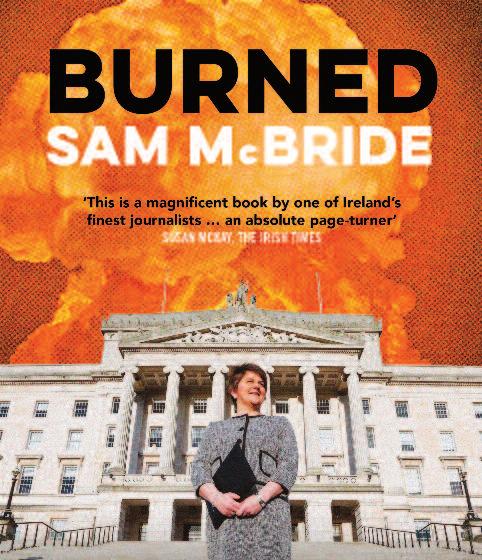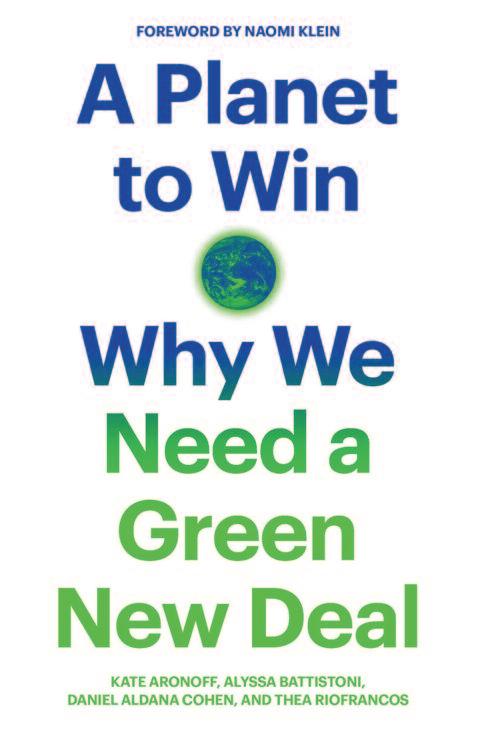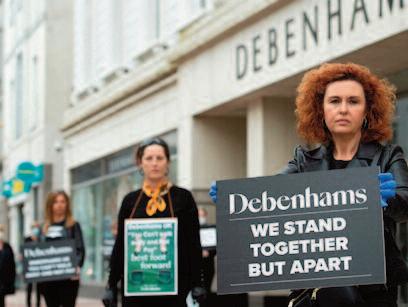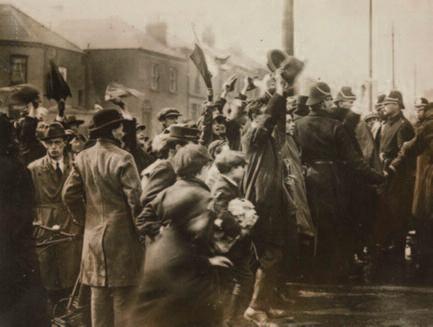
15 minute read
REVIEWED BY AMY FERGUSON
while interesting, and reflective of rooney’s upbringing in a left-wing family in Mayo, were not central.
One of the more interesting criticisms lobbed at rooney is that she is overly Victorian in her telling of a ‘will they, won’t they’romance with class dynamics. In fact, rooney has pointed to the Victorian novel as an influence. Some of the elements of the Victorian novel are there; the intimacy of an overlong glance and the eroticism of a simple touch. The deep exploration of one relationship at the expense of developing peripheral characters. And yet to limit rooney’s narratives and characters to that of a salacious, anti-feminist bodice ripper is to miss the detail.
A friend of mine in an instagram story speculated that‘The real theme of Normal People is that Irish people don’t know how to communicate. ’It’s a funny commentary, but it could in fact be applied more broadly. Victorian relationships, explored by the likes of the Brontë sisters, were limited and drawn out through bourgeois social norms and gender dynamics. Characters admired each other from afar. romance often occurred indirectly. The Monty Python sketch of Catherine and Heathcliffe communicating via semaphore in Wuthering Heights comes to mind. rooney’s characters, by contrast, appear socially liberated. They have sex. They discuss non-monogamy. They debate power dynamics in their college courses. They are unhindered in their social interactions in a way that the Victorian-era protagonists rooney drew from were not. And yet, the miscommunication persists. Marianne, after returning from a weekend home in Sligo where she was verbally abused by her brother and then chastised for provoking him by her mother, cries silently watching television with Connell. She attributes her tears to period cramps. Connell, after having lost his restaurant job, has to move back home to Sligo for the summer. He wants to stay with Marianne in Dublin, but
Burned
By sam McBride
Published by Merrion Press, 2019
reviewed by Daniel Waldron
In Burned, News Letter journalist Sam McBride delves in great detail into the story of the ‘cash for ash’scandal which triggered the collapse of the Northern Ireland Executive in January 2017, drawing from the evidence given to the Coghlin Inquiry, his own research and envelopes full of leaked emails which routinely landed on his desk. The story which unfolds is illuminating on a number of levels, but is perhaps most revealing with regard to the close relationship between the Stormont politicians – particularly the DuP – and big business. he doesn’t ask, and Marianne, assuming that she is essentially unlovable, doesn’t offer.
The social relations and norms have changed since the Victorian-era. undeniable progress has been made. Ireland, as a part of a global trend, has seen a massive expansion of third level education. up until the 1960s a character like Connell would have not been able to finish secondary school, never mind college, and even up to the 1990s it was rare for working-class young people to attend university. Marianne seems removed from the days of the Magdalen laundries and women’s confinement to the home with her Erasmus trips to Sweden, and her eloquent banter in college courses. And yet, Connell feels out of place in Trinity, and caught between his erudite, abstract middle-class peers of college, and his friends working at home in Sligo. Marianne suffers multiple abusive relationships, and deep alienation. Though social progress has been won in the years that separate Brontë and rooney, the fundamental inequality in society that provides the framework for human relationships persists. The strength of rooney’s political message is in the deep exploration of love in a capitalist world, where every inequality and injustice creates potential for misunderstanding.
There are a million other details of the text and series that could be and should be examined: the sensitivity around sex; the tragic death of Connell’s school friend rob; the Trinity scholarship exams. All of these details contribute to a narrative that is above all extremely human and rooted in the realities of modern Ireland. The poignancy of Normal People, in all of its forms, is not in explicit references to Marx or communism, but in demonstrating the unnecessary and heinous difficulties this system thrusts upon us and prompting us as viewers to imagine a world in which two young people in love are not subject to such quotidienne cruelty.n
The Northern Ireland non-domestic renewable Heat Incentive (rHI) scheme was launched in 2012 by the Department for Enterprise, Trade & Investment (DETI) –then headed by current DuP leader and First Minister Arlene Foster – with the supposed aim of meeting Eu targets for use of sustainable heat sources. The scheme was almost an exact copy of its counterpart in Britain. However, it had one crucial element stripped out – cost controls.
Those with biomass boilers under the scheme were given a subsidy based upon its usage. With the subsidy set higher than the cost of the fuel and with no limit on usage, this created a perverse incentive to generate heat unnecessarily in order to make a profit, with the tariffs supposedly locked in for 20 years. rather than encouraging efficiency and promoting environmentally friendly practise, it did the opposite. unsurprisingly, reports of empty barns being heated round the clock to maximise income soon arose.
Why were the cost controls removed? This question is difficult to answer definitively because of the system of oral government instituted by the DuP and Sinn Féin. Minutes of meetings were regularly not taken by civil servants, while much governmental communication was kept off the official record. This allowed the parties to distance themselves from unpopular decisions. However, civil servants testified to the Inquiry that they believed they were working under Ministerial direction to make the scheme more generous than in Britain.
Senior civil servants, the DuP ministers who oversaw the scheme and their special advisors (spads) – highly paid, temporary civil servants appointed by their party – would all claim that they were unaware of this flaw, despite repeated warnings from multiple sources. Indeed, DETI staff were routinely attending industry events where rHI was openly being advertised by boiler installers as a ‘burn to earn’scheme.
While Foster would deny it, communications from her spad, Andrew Crawford, and others would suggest the relaxed attitude to the cost of the scheme was at least partly due to politicians and officials labouring under the false belief that the bill would be entirely covered by the Treasury. Only when it dawned on them, years after the scheme’s launch, that the overspend – at one point, estimated to be as much as £700 million – would come out of Northern Ireland’s budget, and potentially have a political cost to them, did panic ensue.
This feckless attitude to uK taxpayers’money from politicians who profess to put the union above all is clearly a bugbear for McBride. However, the money drawn down through the scheme was never going to benefit the people of Northern Ireland as a whole. Indeed, most of it made its way, indirectly at least, into the coffers of big business, and one multinational in particular – major poultry producer Moy Park.
The DuP’s Andrew Crawford emerges as a central character in the story. While he was a key figure in the department overseeing the scheme, he passed on confidential documents to family members who subsequently became claimants. More important, however, is his close connection with Moy Park. When price controls were finally being considered, he worked to delay and dilute them, and also tipped the company off so they could rush their suppliers in on the‘burn to earn’tariff. In the end, almost half of all claimants on the scheme would be connected to Moy Park. He would also seek to obscure the particular role of the poultry industry, dominated by Moy Park, in the overspend.
Suggestions of corrupt connections between the DuP and wealthy interests are nothing new – red Sky, NAMA, Paisley Jnr’s holidays, the list goes on. What becomes clear, however, is that Crawford’s role as a de facto agent of Moy Park was reflective of the attitude of the Stormont Executive as a whole, which went to extraordinary lengths to assist the company’s expansion. A special team of civil servants was dedicated to the task. The company was given huge grants and subsidies, and assisted in getting around environmental, planning and state aid regulations.
While it is not possible to say definitively because of the informal and secretive nature of Stormont’s operations, McBride raises the question of whether the flawed nature of rHI was a conscious decision to assist Moy Park. It was certainly very convenient for the company. The new heating systems for its suppliers didn’t cost Moy Park a penny, but cut levels of ammonia produced, previously a barrier to its growth. It also allowed Moy Park to cut heat-related payments to its suppliers, forcing many farmers onto the scheme, as these were now being covered through public funds. This contributed to a spike in the firm’s profits.
McBride sees this as undermining the healthy working of a capitalist free market. In reality, this is the modus operandi of modern capitalism. The state acts always to defend the profits of big business. This was graphically demonstrated both in the wake of the 2008 financial crash and now, in the midst of the Covid-19 crisis, with governments rushing to bail out banks and major corporations, and the cost being put on the shoulders of ordinary people. It was also seen in the united campaign by the main Stormont parties to secure the power to cut corporation tax.
While the DuP is undoubtedly the party most heavily implicated in the rHI scandal, the other Stormont parties do not come off well either. There was a failure of the Assembly to adequately scrutinise what was going on, with a culture of simply nodding through legislation not related to divisive, Orange vs Green issues, reflecting the reality that the main parties are largely on the same neo-liberal page when it comes to economic and social policy.
When the scale of the crisis became clear and moves
were made to shut the scheme entirely, Sinn Féin ministers intervened to keep it open for an additional two weeks, and acted to screen their DuP Executive partners from scrutiny. It was only when the scandal emerged in the public domain almost a year later that they called for Foster to temporarily step down as First Minister. But they initially resisted calls for a public inquiry and aimed to keep the Stormont show on the road.
However, the swell of public outrage became irresistible. McBride refers to the BBC Spotlight investigation into the scheme which was aired in December 2016, with reporter Conor Spackman symbolically throwing bundles of notes into a boiler. Watching this, McBride says he was angered as he thought about his mother-in-law, who just weeks earlier had been forced by lengthy NHS waiting lists to pay to see a private neurological consultant and be diagnosed with motor neurone disease. The obvious connection between the impact of austerity and Stormont allowing money to literally go up in smoke enraged people from all backgrounds.
Already under pressure from below, a provocative cut to an Irish language grant by the DuP’s Paul Givan was the final straw. Sinn Féin withdrew from the Executive and collapsed the institutions. What followed was a highly sectarianised election, in which both parties shifted the debate onto divisive issues to distract from their role in rHI.
Burned touches upon many other themes – the nepotism and backbiting within the DuP; incompetent or disinterested ministers; civil servants struggling to grapple with issues they knew little about in underresourced departments, while a bloated apparatus acted to protect the political interests of the two main parties; the inefficient outsourcing of expertise; the revolving door between industries and the public bodies meant to regulate them; the relationship between Stormont and the media.
Fundamentally, however, Burned serves as a damning indictment of the system of government which exists at Stormont, where unionist and nationalist politicians collaborate, often secretively, in implementing neo-liberal policies and serving the interests of big business, while cynically whipping up sectarian tensions when it suits their ends. It serves as an example of how capitalism’s incessant drive for profit undermines and perverts even limited attempts to tackle climate change. Its revelations underline the need to build an anti-sectarian, socialist voice for the working class, in order to challenge this rotten status quo and the system of capitalism itself.n
A Planet to Win
By K. aronoff, a. Battistoni, D.a. Cohen, T. Riofrancos
Verso, 2019
reviewed by Amy Ferguson
Faced with climate catastrophe, the last year has seen the development of important environmental movements and a search for policies that can allow us to transition to an environmentally friendly society. This book is one of many in the last year that makes the case for a green new deal.
In chapter one, the authors correctly conclude that the liberal answer of small individual changes to overcome catastrophe is fundamentally false because it is not working class people who are at fault. They explain, “human beings are creative complicated beings stuck in a capitalist system where a tiny number of people direct most major investments to maximise profits and shape government action accordingly. ”It is noted that the capitalist system externalizes its costs onto communities and ecosystems, and prioritises the bank accounts of CEOs over the long term habitability of the planet and the people who live on it.
Karl Marx had explained over 100 years ago;

“Capitalism tends to destroy its two sources of wealth: nature and human beings. ”With the poverty rate in the uK, one of the richest countries in the world, currently resting at 1 in 5, and with only 100 corporations responsible for 71% of carbon emissions, this couldn’t be more obvious to us today.
It is from this point of understanding that the authors begin to formulate a solution. They criticise the fact that the climate movement in the past has been focused on the actions of the individual, as previously mentioned, but also that demands have had a tendency to be abstract and so having little appeal to ordinary working class people. For example, the long used slogan “80 by 50”( reduce our carbon emissions by 80% by 2050) means little to nothing outside of climate activist circles.
So with this in mind, the authors - again, correctly explain that in order to build a movement to save the earth, you must get working class people on board, and to do so the movement must relate to people by proving that the fight against climate catastrophe is fundamentally tied to the fight for better living and working conditions. For example, through the creation of green, socially necessary, union strong, well paid jobs. At first these jobs may take the form of building / rebuilding eco friendly housing (which could deal with unemployment and the housing crisis in one) or renewable energy technology, conservation work, the transformation of old mines into museums, childcare and a more extensive after school programmes to allow parents to also enjoy more free time. Fundamentally, they state that the ultimate goal is redefining and reducing work. For instance, with workers in their unions having more control over their industries at the expense of profit hungry bosses, developments in automation would mean the reduction of the working week, with no loss of pay, rather than the loss of jobs.
It is also explained that in order to achieve this kind of society it is necessary to build a movement based upon common solidarity amongst working-class people, consisting of trade unions and community groups, to actively mobilise to fight for these things. They express, “radical change only happens when millions of people are organizing, striking and marching, shaping politics and the economy from below. ”
unfortunately, whilst the authors recognise that “capitalism is incompatible with environmental stability” , they qualify that statement with saying, “we have just over a decade to cut across carbon emissions in half. We don’t imagine ending capitalism that quickly. ”Whilst paying lip service to revolutionary change and workers action, the authors ignore, or have no faith in, the genuine power and potential of the working class to break with capitalism, in favour of a programme reliant upon maneuvers within the capitalist system, which are dependent upon progressive politicians invoking change and the capitalist class “complying with democratic values” , which they have proven time and time again, that they are not capable of doing. Such as, historically, when a Latin American country has elected a left government, they are suddenly faced with capitalist coups. restricting yourself to action within the capitalist system, when the current situation requires a break from that system, falls short of what is needed. The authors note that the shift in energy sources to coal and oil deepened imperialist and capitalist relations. They state that in order to avoid the same happening with a transition to renewable sources (particularly with necessary supplies like lithium), it is necessary to build internationalism from below in which climate action groups struggle alongside trade unions to protect the environment and the lives of working-class people, by fighting to “decarbonize, decommodify, decolonise and democratise”our energy grids. However, one thing that is not understood by the authors of this book is that the demands they express are not possible within the confines of capitalism.
Capitalism is a system based and reliant upon constant economic growth and profit margins, no matter the costs upon the planet or human life. The capitalist class has shown time and time again that they are unwilling to allow even minute changes to paper over the cracks of the catastrophe. Only a socialist society can deal with this crisis; by taking energy, transport, production and other key sectors of the economy into democratic public ownership, so that they can be planned to meet the needs of people and the planet. Key to achieve this is building a mass movement which links young people to the organised working-class and its ability to bring capitalism to its knees through its industrial power. n
S cialiSt alternative
i e y . t r s t p a l i i a s o c w . w w o r g i . y n t r a l i s t p a o c i w . s w w













